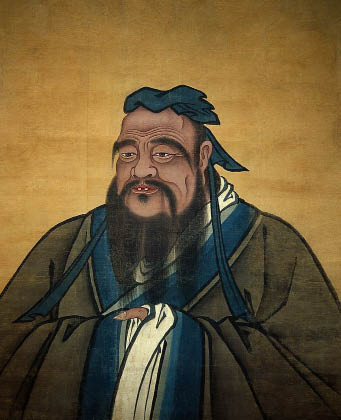| Confucius: Cultural Sage, Philosopher, and Religious Figure
By WEN HAIMING
CONFUCIUS, one of the most influential philosophers in Chinese history, is a household name all over the modern world. His thought has exerted a far-reaching influence on generations of Chinese in almost all areas, including politics, education, values and etiquette. The biopic Confucius, released in January 2010, presented this extraordinary thinker’s unordinary life.
Confucius (551-479 BC) was born in the Spring and Autumn Period (about 770-475 BC) in the State of Lu (today’s Shandong Province). He was a descendant of a noble family associated with the royal house of the Shang Dynasty (1600 - 1046 BC). In spite of his noble birth, he suffered a penurious childhood because his father passed away when he was three and his mother died when he was 17. As an orphan he had to face the world alone.
Never giving in to his bad luck, and to improve his chances of making a better living, he studied diligently while at the same time holding down jobs as storehouse clerk and shepherd. After reaching adulthood, he became an educator and politician, devoting himself to his country. He held various important positions. When he was 52, he served as acting Prime Minister at the position of Minister of Justice. However, he was forced to resign because he held different political views from another powerful politician. Thereafter Confucius left his home state and traveled as a pilgrim scholar, but never again had the opportunity to carry out his political reforms.
In his old age he returned to the State of Lu, where he engaged deeply in education. He took nearly 3,000 disciples, 72 among whom became quite accomplished and famous. Besides teaching, Confucius catalogued and ordered the poems, history, rituals and music of the Zhou Dynasty (1046-256 BC). These documents later became classics and important teaching materials for political education. His lifetime of effort created the Confucian school of thought.
Cultural Sage
 |
| A portrait of Confucius. |
At the turning point of the Spring and Autumn and the Warring States Periods (770-221 BC), radical transformation occurred at the economic, political, and social levels. The prolonged social chaos and fighting corrupted the cultural traditions inherited from ancient times. Aware of this, Confucius carried out the mission of preserving and resurrecting them. The Analects is a record of Confucius’s words and deeds and was written by his disciples and second-generation disciples. We understand Confucius’ political philosophy today mainly through the Analects.
Confucianism is a magnificent and uplifting doctrine, full of sagacity and addressing both the practical and spiritual components of a community. Confucius had a great understanding of the ancient ritual system and classics. He taught his disciples ancient classics and these were passed from generation to generation. He also combined his life experience and concerns for his state and its people into his teaching, forming the Confucian school. This so-called religion finally came to be an inextricable part of Chinese culture after many generations of Confucianists’ sustained efforts.
The focus of Confucian teaching is the dao (way) of culture, i.e., “this culture of ours (siwen 斯文).” Confucius called himself the successor of the flourishing culture of the Zhou Dynasty. He pointed out that intellectuals should be broad-minded and deeply determined, as cultural transmission is a long and arduous task.
In one story, Confucius asked his four disciples about their ideals. The first three students said they wanted to stick to his teachings and perform their duties. But the last one said he only wanted to go to swim in the river, and enjoy the gentle and cool breezes of spring with some friends and children. Confucius approved of the last disciple, for showing that he not only cared for formal matters but also appreciated the many other joys of life. He exhorted his students to be unworldly, which exemplifies the height of Confucian values. Because Confucian philosophy uplifts the spirit in this way, it attracted much attention from generations of rulers in history and finally became the mainstream of Chinese culture.
| 